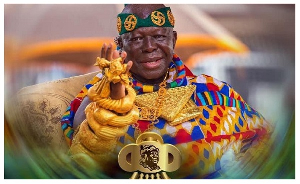Opinions of Saturday, 29 August 2015
Columnist: Shirley Asiedu Addo
Gift Tax: The obligation no one honours
Gifts come on special days and occasions for specially loved ones; people you care about. They usually put a smile on the receiver’s face and a feeling of fulfilment in the heart of the giver.
They come in cash or kind. In Ghana, there are many gift shops with many different items.
Gifts can be in the form of clothing, toiletries, foodstuffs, toys, electronic gadgets, cars and houses depending on who is giving and who is receiving the gift.
They may save you some money and even save a life.
A gift is something given willingly to someone without payment.
It is given to show appreciation, love and care. Many religions give great importance to giving gifts and in most cases, the act of giving has been noted to be the most rewarding.
The Bible for instance states that it is more blessed to give than to receive.
The Koran also has as one of its main pillars the act of giving alms.
Dictionary.com defines a gift as something given voluntarily without payment in return, as to show favour toward someone, honour an occasion or make a gesture of assistance.
But just imagine paying taxes on the gifts you get. Whether you believe it or not, the gift tax is a type of tax in the tax laws of Ghana.
For all who are not too familiar with the word tax, tax is a compulsory contribution to state revenue, levied by the government on workers' income and business profits, or added to the cost of some goods, services and transactions.
The law
By virtue of the provisions of Chapter III, Section 106 of the Internal Revenue Act, (Act 592), Taxable Gift means any of the following assets situated in Ghana, including buildings of permanent or temporary nature, land, shares, bonds and other securities, money, including foreign currency business and business assets, any means of transportation (land, sea or air).
Taxable gifts under the law also include other qualifying goods or possessions; part of, or any right or interest in, to, or over any of the above assets and an asset or a benefit situated in Ghana or outside Ghana, received by a resident person as a gift; an asset situated in Ghana or outside Ghana, received by or for the benefit of a resident person as a gift where the asset has been credited in an account, invested, accumulated or capitalised in the name of or on behalf of or at the direction of that person.
It also includes any monetary consideration or any consideration in any other form aimed at ensuring the performance of an act or an omission which goes to the benefit of a resident person.
The Internal Revenue Act 592 stipulates that Ghanaians are to pay 15 per cent gifts tax rate on any gift valued at GH¢50 and above.
The value of the gift would be determined according to the market value of the gift at the time you received it. And note, the receiver is expected to pay it within 30 days of receiving such a gift.
The Ghana Revenue Authority (GRA) has explained that once you receive a gift in whatever form, it is an income to you, and you must pay a tax on that gift.
The total value of a taxable gift does not include the value of a taxable gift received by a person under a will or upon intestacy by that person from that person’s spouse, child, parent, brother, sister, aunt, uncle, nephew or niece by a religious body which uses the gift for the benefit of the public or a section of the public or for charitable purposes.
Implementation
I will not say whether the GRA has any problems with the law on paper but many questions come up with the implementation of this law than answers are available.
The questions go to both the layman and even for the revenue collection authority itself.
How much tax do I pay, for instance, on a basket of snails received from a farmer friend in a village where snails are cheaper?
The authority says it is hard to track who receives a gift from whom at any particular time.
The acting Deputy Commissioner of GRA in charge of Communications and Corporate Affairs, Mr Kwasi Oppong-Damoah, last year told the media it was important that people were encouraged to voluntarily declare gifts they received.
Even though others are suggesting that for convenience the giver should be the one paying, tracking the giver is also a challenge, he said.
The few interviews I conducted on people’s perception about gift tax may paint the law on gift tax as useless and unnecessary.
What people think
“We are not paid well. When we are given gifts too, then government wants to collect taxes. It will not work in Ghana here. I don’t think any minister or public official has ever paid tax on gifts. Do they pay taxes on the sheep, goats, kente and food stuffs which they receive when they visit communities?” Nii Boye asked.
“Really! I do not know about it. When did such a law come? But really I won’t pay gift tax. I don’t think I will go voluntarily to pay taxes on gifts I receive. And I don’t think there is a system to check who gave what gift to who. I wonder whether such laws are relevant.
“I know about gift tax. I heard about it only recently. In fact, it will not hold. They may easily collect taxes on bribes. I don’t think it will work but if it will work, it should start from the top; those up there are the ones who receive gifts worthy of taxing,” a teacher and media practitioner said.
Not one of the about 10 people I interviewed thought it was a good idea.
It is no wonder that Mr Kofi Owusu Afriyie of the Tax Audit Unit of the GRA in Cape Coast observed that for the 15 years that he had worked with the authority, no one had come to voluntarily pay gift tax.
He said the GRA expected that people come and pay gift tax voluntarily and not under compulsion.
Until Ghanaians understand the need to pay tax on gifts, GRA says it will continue to educate people on the importance of all taxes to the socio-economic and infrastructural development of the country.
Why pay
Without taxes, including gift taxes, the government is likely to grind to a halt. For now, Mr Afriyie says the GRA is relying on the honesty of the taxpayer to ensure that gift taxes are paid to support development efforts.
He said the GRA would also intensify education on the need to pay taxes to make their job easier.
So the next time you receive a gift, value it and find out how much you need to pay in taxes. And please pay to the GRA, they expect that you pay.













